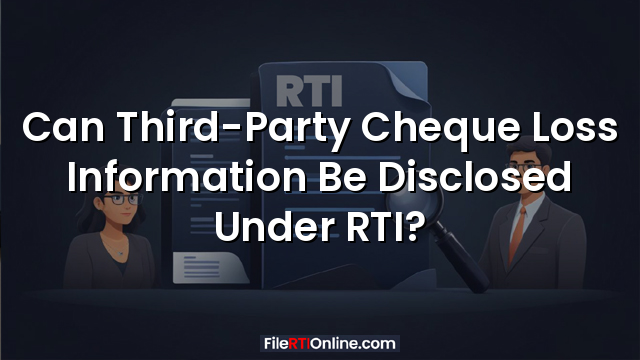Can Third-Party Cheque Loss Information Be Disclosed Under RTI? Understanding When Public Interest Overrides Privacy
Financial information held is generally protected under the Right to Information (RTI) Act, especially when it relates to third parties. Section 8(1)(j) prevents disclosure of personal information that has no relationship to public activity and may invade an individual’s privacy. However, certain situations raise an important question: Can banks disclose third-party information when it directly affects an ongoing legal proceeding or serves a larger public interest?
This article explains the legal position using a real case involving a cheque loss complaint and the Central Information Commission’s (CIC) reasoning on when such information must be disclosed.
Why Third-Party Financial Information Is Usually Restricted
Banks hold highly sensitive personal data such as account details, transactions, complaints, and communications submitted . Under Section 8(1)(j) of the RTI Act, such information is exempt because:
- It is personal in nature
- It is held in a fiduciary capacity
- Disclosure may invade the privacy of the account holder
- There is no public activity that justifies disclosure
However, this exemption is not absolute. If larger public interest is established, the information can be disclosed.
Case Example: Seeking Cheque Loss Information Under RTI
Background of the RTI Request
The appellant sought information from Bank of Baroda regarding whether a particular account holder had reported the loss of a cheque. The bank refused disclosure citing Section 8(1)(j), arguing that:
- The appellant was not the account holder
- The requested information related to a third-party customer
- Disclosure would violate privacy
Appellant’s Argument
The appellant explained that:
- The drawer of the cheque had submitted a false affidavit in court
- He needed the bank’s records to prove whether the affidavit about the “misplaced cheque” was genuine
- The information was necessary to assist the court in determining the truth
This introduced a key element: public interest in facilitating fair judicial proceedings.
CIC’s Analysis and Decision
The Central Information Commission observed:
- The appellant was seeking information not for personal gain, but to ensure that the court received correct factual information.
- When information is required in connection with a legal proceeding, it becomes a matter of public interest, especially when it may expose a false claim.
- Public interest here outweighed the privacy exemption under Section 8(1)(j).
Outcome
The CIC directed the bank to provide the requested information, holding that correct facts must be available to the judiciary. The exemption could not be used to protect potential misuse of the legal process.
When Banks Must Disclose Third-Party Information Under RTI
Based on CIC precedents, disclosure becomes permissible when:
1. The information is directly relevant to a court case
If the information is required to establish facts in an ongoing or pending legal matter, public interest is automatically involved.
2. The information prevents misuse of law
Where a third party may have submitted false affidavits or misleading documents, disclosure supports justice.
3. Larger public interest is demonstrated
The applicant must explain how the disclosure serves an objective that goes beyond personal curiosity.
4. The information does not expose highly sensitive financial details
Disclosure may still be limited to the specific facts required for justice.
What Type of Cheque-Related Information Can Be Sought Through RTI?
You may request:
- Whether a cheque was reported lost or stolen
- Whether a stop-payment request was made
- Date of the complaint lodged account holder
- Communication submitted to the bank regarding the cheque
This does not include:
- Account balances
- Complete transaction history
- Signature copies
- KYC documents
- Personal correspondence
Only information directly relevant to establishing truth in a legal matter may be disclosed.
How to Structure an RTI for Cheque-Related Information
A clear and specific RTI application improves your chances of success. You may ask:
- Whether any complaint regarding loss/misplacement of cheque number ______ was received bank.
- Date and mode of such complaint (in writing, orally, online, etc.).
- Whether a stop-payment instruction was issued for the cheque.
- Certified copy of the complaint or register entry (if permissible under public interest).
In the RTI, you should also mention:
- Details of the legal proceeding
- Why the information is necessary
- How disclosure will support the court in determining correct facts
Conclusion
While third-party financial records are generally protected under Section 8(1)(j) of the RTI Act, public interest can override the privacy exemption, especially when the information is required for legal proceedings. The cheque-loss case demonstrates that the RTI Act prioritizes truth and justice over blanket confidentiality claims . Applicants must, however, provide a clear justification showing that disclosure serves a legitimate public purpose.


